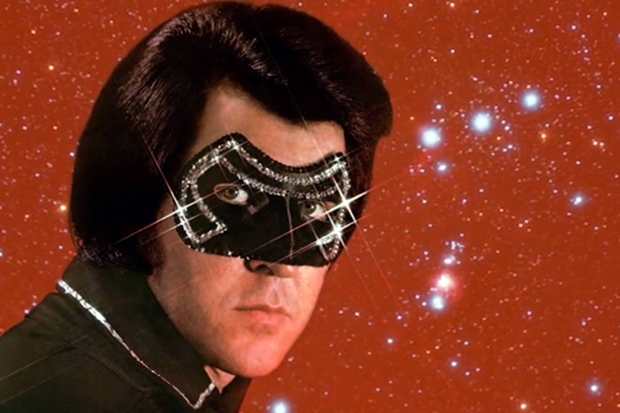Not that long ago the BBC trumpeted a new Stakhanovite project to big up the arts in its many and various hues. And praise be, this it is jolly well doing with all sorts of dad rock docs, homages to painters and poets, while Sralan Yentob (as he surely ought at the very least to be, and soon) continues to knock frock-coated on doors like a highly remunerated person from Porlock.
Before multichannels and multi-platforms, great arts coverage was (if memory serves) done without much song and dance. Lest we forget, Yentob was once a progenitor of Arena. Long the haven of burgeoning filmmakers such as Mary Harron, James Marsh and some bloke called Scorsese, Arena is 40 this month and it’s still the best. If you know what’s good for you, watch Night and Day, its typically oblique trawl through its own archive on BBC Four this Sunday.
But there’s still good stuff elsewhere. In the quivering bubble that is the arts, the deselection of Mark Lawson as Front Row’s head chef caused a minor kerfuffle. My own view is that his radio interviews were growing grandly self-referential. By contrast, his hour-long encounter with David Hare on BBC Four (Sunday) had room to spread out, and was a reminder of how little breathable one-on-one conversation makes it on to television these days. Whatever you make of the plays, Hare knows how to charm the birds from the trees in reasoned paragraphs. Also he persuasively embedded the story of his postwar upbringing — and promotion via a scholarship to the middle classes — into the wider story of Britain’s slow, anxious unbuttoning between 1945 and 1970, which is roughly when he started writing plays. He was candid, albeit unapologetic, about his capacity for causing irritation, ‘a quality in me over which I can do very little’. This was television unafraid to mimic the virtues of radio.
Proper documentary is an expensive and amorphous form, often ill fitted to the rigid hour-long slots of today’s gridded schedules. Therefore give thanks for Storyville, where elegantly crafted feature-length documentaries come home to roost on television. Its latest was Orion: The Man Who Would Be King (Monday), made by Jeanie Finlay with the support of Creative England and Ffilm Cymru. This was a very fine arts film about a singer you (by whom I mean I) have never heard of.
Jim Ellis, who later traded as Mr Excitement, the Cadillac Man and Steven Silver, was better known as Orion. His sort of heyday came when Elvis had eaten his last peanut-butter burger. A nation giving credence to UFOs and Creationism was ready to suck up a conspiracy theory that the king still lived. Ellis, a lantern-jawed Alabama lunk who’d already had one crack at a recording career in Los Angeles, was loitering in Nashville, his calling card a voice that was spookily similar to Presley’s, as was the sculpted quiff.
It so happened that an author called Gail Brewer-Giorgio had penned a fantasy novel about a rock’n’roll idol named Orion who was just pretending to be dead. Her book, and Ellis’s voice, both came to the attention of Shelby Singleton, a music impresario and the most sued man in Tennessee. He took the pair of them for a ride. Brewer-Giorgio merely lost her copyright. Ellis lost his whole identity. The career he’d always craved was his, so long as he agreed to perform in a mask and never take it off in public.
This was a southern gothic parable about the lawless frontier of the music industry. Naturally, it ended badly. Ellis was shot back in Alabama by a passing gunman, his life snuffed out early just like the star he hated impersonating. His ghost haunted the film in the shape of an old phone interview, while a gargoyles’ gallery of wall-eyed lard buckets and other good ol’ boys remembered the sad tale of the man who wouldn’t be king, a wannabe crooner trapped in a media construct more exploitative than even the grimmest glint in the Svengalian eye of Simon Cowell.
Ellis barely made a bean, although there were tawdry fringe benefits: lashings of motel tumbles with itinerant groupies, from whom he gathered a library of gynaecological polaroids for private use. ‘He got a picture of every …Lucy is what I call mine,’ recalled a trim-looking fan in her fifties called Sharon Attaway Nettleton. ‘How did he know whose was whose?’ She didn’t say if he took his mask off in bed. The minute he did in public, his career died.
Ellis’s yearning for identity was thwarted at birth: fostered at two, adopted at five, he never knew who he really was even without his mask. But he was the spit of Presley’s father Vernon, which perhaps explained why he sounded like Vernon’s son. The icing on the cake of this melancholy film would have been a DNA test revealing all. We met Ellis’s son Jimmy Jnr, a dignified hick with a Bammy accent straight out of Forrest Gump. Lisa Marie Presley, potentially his first cousin, may not have felt inclined to spit into a tube.






Comments